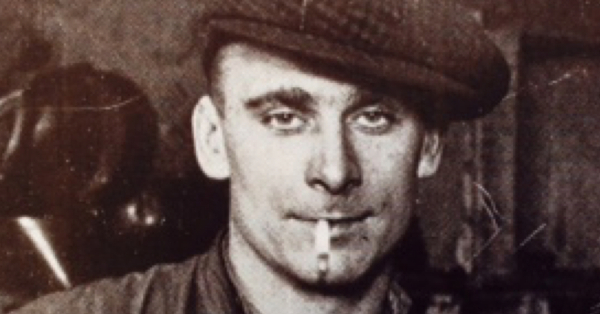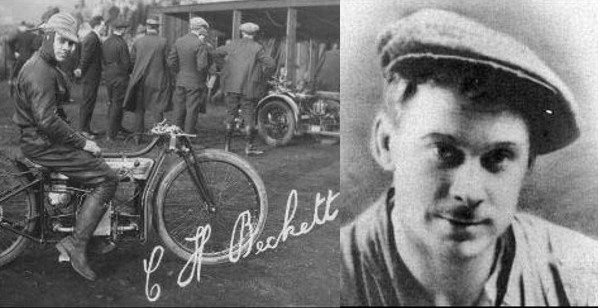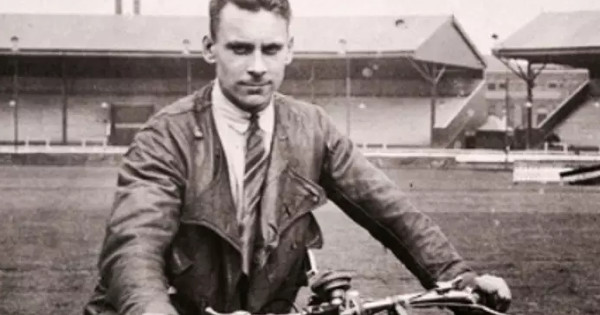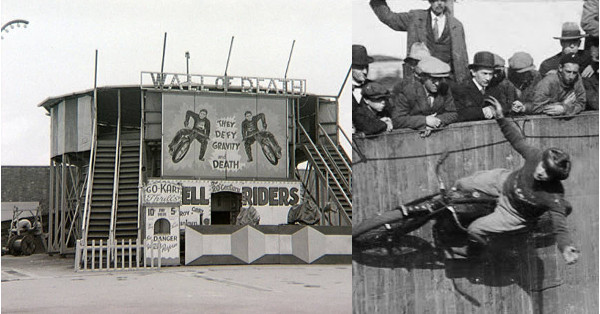'Dare Devil Rides to Jarama'
Speedway superstar Clem Beckett's story comes to theatres around the UK
John Newman
The first Speedway meeting in the UK was staged at Epping Forest's High Beech in 1928. There is some debate about the origins of the sport. But many agree that it originated in Australia sometime in the early 1900s, and was quickly taken up in the US in the form of flat track racing.
Riders slide around dirt ovals, kicking up plumes of shale from their rear tyres at high speed. They're inches apart from other competitors, on bikes with roaring engines and no brakes. This soon captured the public's imagination, and spectators filled new tracks and stadiums up and down the country. Promoters hustled to cash in, recognising the sport's spectacular appeal, as well as the diversion it created from the grim time had by many between the two world wars.
Speedway is still a popular sport, especially in mainland Europe. Today's riders often have busy schedules, travelling across countries to ride for clubs. Eurosport screens the whole
world championship series. Which was won this year by the US rider Greg Hancock, with UK's Tai Woffinden taking second.
Dare Devil Rides to Jarama is the play that's touring the UK at the moment, which tells the story of Clem 'Dare Devil' Beckett, a famous speedway rider from the 20s and 30s. Beckett combined his skill and daring on the track with his concern that riders should get a decent reward for the risks they took.
Coming from a working class family in Oldham, he was involved in the everyday struggles of working people to improve pay and conditions. And it was this concern for justice that took him to Spain, to fight with the International Brigade against the rising threat of Fascism.
The first half of the play is about Beckett as a rider. He was a good-looking young man, and due to his winning exploits on the track, a very popular rider. Like many in the sport, he loved the adrenaline rush, the noise, and the smell of hot engines filling his nostrils (he was born in 1906 in Oldham, initially working as a blacksmith).
More tracks began to open, and the need for more riders came with it. Promoters pulled many young and inexperienced riders into the teams. Those who were after a share of the glory that accrued to riders like 'Dare Devil' Beckett. Many came to grief and were injured. In response to this, Beckett organised the Dirt Track Riders Association. Which would try to improve the conditions for riders with the promoters and the ACU.
In 1929, the association teamed up with two partners, Spencer Stratton and Jimmy Hindle. Using the money they earned from riding, they bought land at Owlerton Meadows, in Sheffield, and started the Sheffield Tigers Speedway team. A team still rides there today as part of Speedway's Premier League.
Beckett was a consummate rebel, with a heart that beat as strongly for justice as it did for riding. He finally fell out with the Speedway 'authorities' and went on to ride in Europe, supplementing his earnings by developing and riding what we now call the 'Wall of Death' at fairs all over continental Europe.
In telling this part of the story, the play, handled by two actors, uses a lot of humour. And the audience, given rattles as they take their seats, are encouraged to participate (noisily) at various points.
After the interval, the story concentrates on the period from 1936, when Clem Beckett decides to go and fight for the Republic in Spain. He heads a small convoy of ambulances to Barcelona, striking up an unlikely friendship with writer Chris Caudwell.
Caudwell didn't carry the same 'daredevil' temperament as Beckett. He'd intended to return to England once the ambulances were delivered to the army fighting Franco. But Caudwell stayed, joining the International Brigade, where they died together along with hundreds of others, preventing the breakthrough of the Fascist army at Jarama.
It's rare that motorcycling is represented in the theatre or on screen. This was a turbulent and dangerous time in the (recent) history of the world. Young men and women from all over the world recognised the dangers. Volunteering to fight as part of the International Brigade against oppression, death and cruelty. We all know what happened in the aftermath of the Spanish Civil War in 1936. The memories live with those who are still alive today.
Clem 'Dare Devil' Beckett was a unique individual. A motorcycle rider through and through, who combined his love of the track with a brave humanity. Tour dates for 2017 can be found at
www.townsendproductions.org.uk. Information about the role of the International Brigades and who fought with them is at
/www.international-brigades.org.uk.
There's also a
National Speedway Museum, located at Broxbourne in Hertfordshire - the initiative of ex Hackney speedway rider, Peter Saunders.
Have you been to see
Dare Devil Rides to Jarama? Tell us what you thought of it at
[email protected].
Comments
13/12/16 - Keep my eye out for that
15/15/16 -It is a play Brian they may make a film I think interesting as a friend whom I have not seen for years in charge of foundries I think he is in Nigeria now last heard off after he moved on from Jamaica as he used to do work for Barry Crump as he is our former world Champion Jason Crump dad . The last people I seen that was Speedway was Billy Sanders & company . TEX.
15/15/16 -Little known story of a motorcycling "hero" retold.



